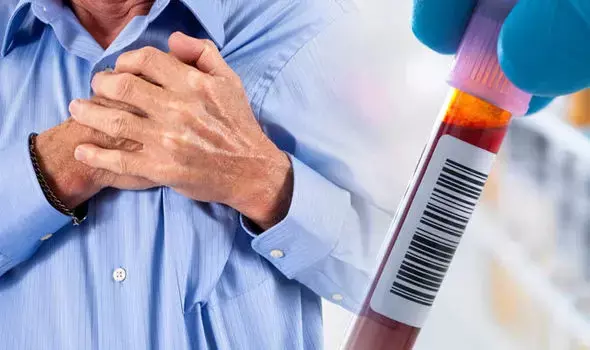- Home
- Medical news & Guidelines
- Anesthesiology
- Cardiology and CTVS
- Critical Care
- Dentistry
- Dermatology
- Diabetes and Endocrinology
- ENT
- Gastroenterology
- Medicine
- Nephrology
- Neurology
- Obstretics-Gynaecology
- Oncology
- Ophthalmology
- Orthopaedics
- Pediatrics-Neonatology
- Psychiatry
- Pulmonology
- Radiology
- Surgery
- Urology
- Laboratory Medicine
- Diet
- Nursing
- Paramedical
- Physiotherapy
- Health news
- Fact Check
- Bone Health Fact Check
- Brain Health Fact Check
- Cancer Related Fact Check
- Child Care Fact Check
- Dental and oral health fact check
- Diabetes and metabolic health fact check
- Diet and Nutrition Fact Check
- Eye and ENT Care Fact Check
- Fitness fact check
- Gut health fact check
- Heart health fact check
- Kidney health fact check
- Medical education fact check
- Men's health fact check
- Respiratory fact check
- Skin and hair care fact check
- Vaccine and Immunization fact check
- Women's health fact check
- AYUSH
- State News
- Andaman and Nicobar Islands
- Andhra Pradesh
- Arunachal Pradesh
- Assam
- Bihar
- Chandigarh
- Chattisgarh
- Dadra and Nagar Haveli
- Daman and Diu
- Delhi
- Goa
- Gujarat
- Haryana
- Himachal Pradesh
- Jammu & Kashmir
- Jharkhand
- Karnataka
- Kerala
- Ladakh
- Lakshadweep
- Madhya Pradesh
- Maharashtra
- Manipur
- Meghalaya
- Mizoram
- Nagaland
- Odisha
- Puducherry
- Punjab
- Rajasthan
- Sikkim
- Tamil Nadu
- Telangana
- Tripura
- Uttar Pradesh
- Uttrakhand
- West Bengal
- Medical Education
- Industry
Remnant Cholesterol Tied with CV Mortality in T2D, CKD & Diabetic Nephropathy Patients

Genetic, observational, and clinical intervention studies indicate that circulating levels of triglycerides and cholesterol transported in triglyceride-rich lipoproteins (remnant cholesterol) can predict cardiovascular events. In a study, researchers have found that remnant cholesterol (remnant-C) was associated with a higher risk of death with CVD in patients with type 2 diabetes (T2D), chronic kidney disease (CKD) and incident diabetic nephropathy.
The study findings were published in The Journal of Clinical Endocrinology & Metabolism on July 22, 2021.
The association between remnant cholesterol and cardiovascular mortality in patients with T2D and incident diabetic nephropathy remains unclear. Therefore, Dr Zhanzheng Zhao and his team conducted a study to examine the association between remnant-C and cardiovascular mortality in patients with T2D, KD stages 3 to 5, and newly diagnosed DN.
The researchers determined the baseline lipid profile and searched for deaths with CVD within 2 years of baseline among 2,282 adults enrolled between January 1, 2015, and December 31, 2016, who had T2D, CKD stage 3 to 5, and newly diagnosed DN. They used adjusted logistic regression models to assess the associations between lipid, especially remnant-C concentration (either as continuous or categorical variables), and risk of cardiovascular mortality.
Key findings of the study:
♦ Upon multivariable-adjusted analyses, , the researchers found that
- Low-density lipoprotein cholesterol (ldl-c) (odds ratio [or], 1.022),
- High-density lipoprotein cholesterol (hdl-c) (or, 0.929),
- Non–HDL-C (OR, 1.024), and
- Remnant-C (OR, 1.115) but not triglycerides were associated with cardiovascular mortality.
♦They also found that atherogenic dyslipidemia (triglycerides > 150 mg/dL [1.69 mmol/L] and HDL-C < 40 mg/dL in men or < 50 mg/dL in women) was associated with cardiovascular mortality (OR, 1.073).
♦ They noted that remnant-C ≥30 mg/dL differentiated patients at greater risk of CVD mortality from those with lower concentrations, particularly for interaction with LDL-C level >100 mg/dL.
♦ They observed patients with higher levels of both remnant-C and LDL-C (OR, 1.696) were at the greatest risk of death with CVD.
The authors concluded, "In patients with T2D, CKD stages 3 to 5, and incident DN, remnant-C was associated with a higher risk of death with CVD. Different from the general population, the interaction of remnant-C and LDL-C was associated with the highest risk of cardiovascular mortality."
For further information:
Medical Dialogues Bureau consists of a team of passionate medical/scientific writers, led by doctors and healthcare researchers. Our team efforts to bring you updated and timely news about the important happenings of the medical and healthcare sector. Our editorial team can be reached at editorial@medicaldialogues.in.
Dr Kamal Kant Kohli-MBBS, DTCD- a chest specialist with more than 30 years of practice and a flair for writing clinical articles, Dr Kamal Kant Kohli joined Medical Dialogues as a Chief Editor of Medical News. Besides writing articles, as an editor, he proofreads and verifies all the medical content published on Medical Dialogues including those coming from journals, studies,medical conferences,guidelines etc. Email: drkohli@medicaldialogues.in. Contact no. 011-43720751


